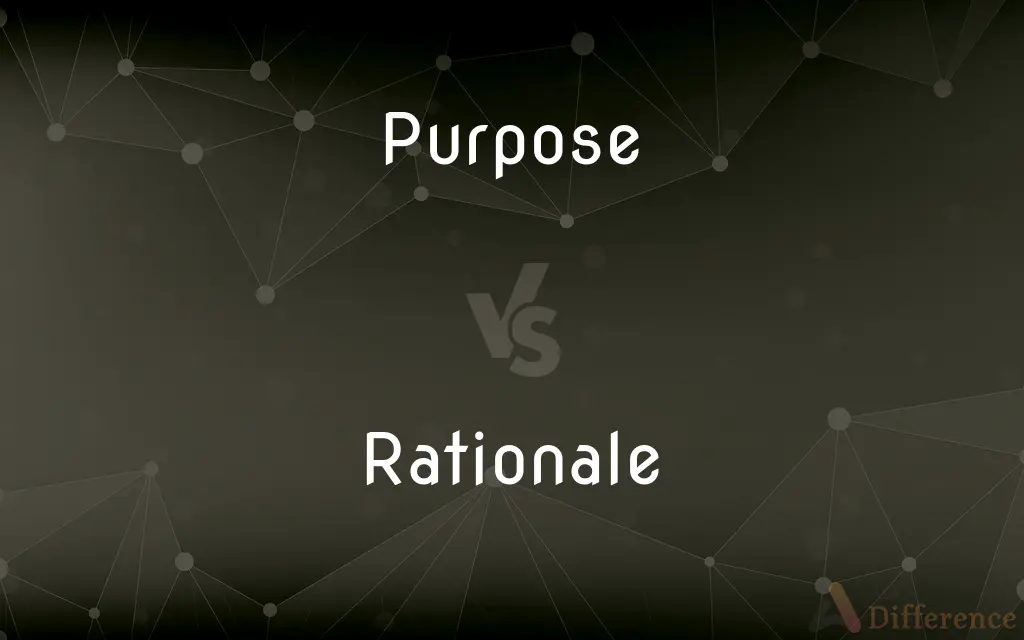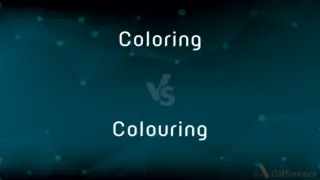Purpose vs. Rationale — What's the Difference?
By Urooj Arif & Maham Liaqat — Updated on April 24, 2024
Purpose describes the intended goal of an action or object, focusing on the 'what' and 'why'; rationale explains the reasoning behind a decision, emphasizing the 'why' specifically.

Difference Between Purpose and Rationale
Table of Contents
ADVERTISEMENT
Key Differences
The concept of purpose pertains to the overarching goal or objective behind an action, project, or existence of an entity. It answers questions about the aim or the intended outcome. Rationale, on the other hand, delves into the reasoning or justification for a decision or action, often providing a detailed explanation of the underlying motives.
Purpose is often described in terms of end goals or targets that a person, organization, or project aims to achieve. It sets the direction and end point. Whereas rationale focuses more on the thought process or logic that supports the pursuit of these goals, providing a bridge between the goal and the methods employed to reach it.
In practical applications, purpose can be seen as a brief and broad statement of intent, such as the purpose of an educational program being to impart knowledge. Rationale, on the other hand, would explain why imparting knowledge is important in the context of the program, addressing educational theories or societal needs.
When defining roles or missions, the purpose is typically straightforward and direct, such as a charity’s purpose to alleviate poverty. Rationale, however, often incorporates broader contextual factors, such as economic data or social research, which justify why alleviating poverty is critical.
While both purpose and rationale are used to provide direction and understanding, purpose is more about defining goals and desired outcomes, whereas rationale provides the logical foundation that supports these decisions.
ADVERTISEMENT
Comparison Chart
Definition
The aim or objective of an action or decision.
The justification behind an action or decision.
Focus
Outlines 'what' is to be achieved and sometimes 'why'.
Primarily explains 'why' something should be done.
Usage in Speech
Often used to state intentions or objectives.
Used to discuss reasoning or arguments.
Detail
Generally broader and less detailed.
More detailed and analytical.
Associated Terms
Goal, objective, aim.
Reasoning, justification, logic.
Compare with Definitions
Purpose
The reason for which something is done or created.
The purpose of the meeting is to improve communication.
Rationale
An explanation of controlling principles of opinion, belief, practice, or phenomena.
The rationale behind closed meetings is confidentiality.
Purpose
The subject in hand; the point at issue.
The purpose of this discussion is to resolve conflict.
Rationale
The fundamental reason or reasons serving to account for something.
The rationale for the new policy was not clear.
Purpose
An intended or desired result; end; aim; goal.
His purpose in life is to help others.
Rationale
A set of reasons or a logical basis for a course of action or belief.
He explained the rationale for his plan.
Purpose
Determination; resoluteness.
She went to college with a clear purpose.
Rationale
The underlying reasoning or basis.
The rationale of the legal decision involves complex legal theories.
Purpose
Practical result, effect, or advantage.
The law has operated with little real purpose.
Rationale
A statement of reasons.
She outlined the rationale behind her decision.
Purpose
The object toward which one strives or for which something exists; an aim or goal
Her purpose in coming here is to talk to you. The purpose of an airliner is to transport people.
Rationale
The fundamental reasons for something; the basis
The rationale for dropping the atomic bomb.
Purpose
Determination; resolution
He was a man of purpose.
Rationale
An explanation of the basis or fundamental reasons for something.en
Purpose
To intend or resolve
"the gap between what is said and what is purposed" (Ian Donaldson).
Rationale
A justification or rationalization for something.
Purpose
The end for which something is done, is made or exists.
What is the purpose of your visit?
My purpose in coming to Egypt was simply to take it en route to the desert.
It has been my purpose to illustrate rather than to explain.
The exceptionally small gate-leg table served the purpose of a tea table admirably.
The purpose of the device is to prevent the breechblock from opening accidentally should the gun be held barrel down.
The purpose of this letter is to set the record straight.
The purpose of this book is to study the interrelationship of government and religion.
The device can be used for both civilian and military purposes.
The purpose of turning off the lights overnight is to save energy.
Rationale
A liturgical vestment worn by some Christian bishops of various denominations.
Purpose
Function, role.
Rationale
An explanation or exposition of the principles of some opinion, action, hypothesis, phenomenon, or the like; also, the principles themselves.
Purpose
(Sense of having a) meaning for existing or doing something.
Rationale
(law) an explanation of the fundamental reasons (especially an explanation of the working of some device in terms of laws of nature);
The rationale for capital punishment
The principles of internal-combustion engines
Purpose
Resolution; determination.
Purpose
(obsolete) The subject of discourse; the point at issue.
Purpose
(transitive) To have or set as one's purpose or aim; resolve to accomplish; intend; plan.
Purpose
(intransitive) To have (an) intention, purpose, or design; to intend; to mean.
Purpose
To discourse.
Purpose
That which a person sets before himself as an object to be reached or accomplished; the end or aim to which the view is directed in any plan, measure, or exertion; view; aim; design; intention; plan.
He will his firste purpos modify.
As my eternal purpose hath decreed.
The flighty purpose never is o'ertookUnless the deed go with it.
Purpose
Proposal to another; discourse.
Purpose
Instance; example.
Purpose
To set forth; to bring forward.
Purpose
To propose, as an aim, to one's self; to determine upon, as some end or object to be accomplished; to intend; to design; to resolve; - often followed by an infinitive or dependent clause.
Did nothing purpose against the state.
I purpose to write the history of England from the accession of King James the Second down to a time which is within the memory of men still living.
Purpose
To have a purpose or intention; to discourse.
Purpose
An anticipated outcome that is intended or that guides your planned actions;
His intent was to provide a new translation
Good intentions are not enough
It was created with the conscious aim of answering immediate needs
He made no secret of his designs
Purpose
What something is used for;
The function of an auger is to bore holes
Ballet is beautiful but what use is it?
Purpose
The quality of being determined to do or achieve something;
His determination showed in his every movement
He is a man of purpose
Purpose
Propose or intend;
I aim to arrive at noon
Purpose
Reach a decision;
He resolved never to drink again
Common Curiosities
How do I explain the rationale of a decision?
Outline the reasons and logical basis that led to the decision.
Can a project have both a purpose and a rationale?
Yes, a project typically has both a purpose, which is its goal, and a rationale, which explains why that goal is important.
How do I determine the purpose of an action?
Consider what the intended outcome or goal of the action is.
What is the difference between purpose and rationale?
Purpose refers to the goal or objective aimed at, while rationale is the reasoning or justification behind a decision.
Is rationale more important than purpose?
Not necessarily; both are important but serve different functions. Purpose provides direction, and rationale provides justification.
Do all business decisions require a rationale?
While not all decisions may have a clearly stated rationale, it is good practice to have a reasoned basis for business decisions.
Can the purpose and rationale of a project change over time?
Yes, as circumstances change, both the purpose and the rationale may evolve.
Can a person’s life have a purpose and rationale?
Yes, individuals often define their life’s purpose and the rationale behind their life choices.
What is an example of rationale in a healthcare setting?
The rationale for promoting handwashing is to prevent the spread of infections.
How detailed should a rationale be?
It should be detailed enough to clearly explain the reasoning behind decisions or actions.
Does rationale always involve complex reasoning?
Not always; the complexity of the rationale depends on the complexity of the decision or action.
What is an example of a simple purpose?
The purpose of a doorstop is to keep the door open.
How should I use the terms purpose and rationale in academic writing?
Use 'purpose' to describe the aim of your study or paper and 'rationale' to explain why the study is necessary or important.
Is it possible for something to have a purpose but no rationale?
Typically, most purposes have some rationale, even if it is not explicitly stated.
How can understanding the rationale help in business?
It helps in making informed decisions and explaining those decisions to stakeholders.
Share Your Discovery

Previous Comparison
Europe vs. Africa
Next Comparison
Coloring vs. ColouringAuthor Spotlight
Written by
Urooj ArifUrooj is a skilled content writer at Ask Difference, known for her exceptional ability to simplify complex topics into engaging and informative content. With a passion for research and a flair for clear, concise writing, she consistently delivers articles that resonate with our diverse audience.
Co-written by
Maham Liaqat












































